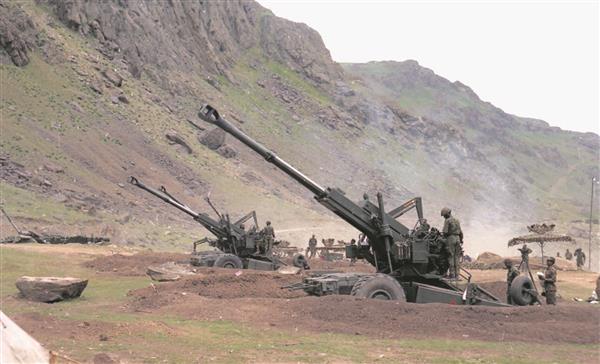

It is nobody’s case that corruption and transgression in military contracts should, in any way, be overlooked and not probed. But the CBI’s overall track record in this regard is as disappointing as the MoD’s debatable decision-making in building India’s military capability.
Inquiries by the Central Bureau of Investigation (CBI) into innumerable cases of questionable Indian materiel purchases over the past four decades have largely failed not only in securing convictions or conclusively proving criminality, but conversely, they have impeded military modernization, in turn adversely impacting operational efficiency.
Beginning with the Bofors howitzer import scandal in the late 1980s, followed soon after by the interminably investigated purchase of German HDW Type 209/1500 diesel-electric conventional submarines (SSKs), anti-materiel rifles, air defense systems, surface-to-air missiles (SAMs), VVIP helicopters and other assorted equipment, the probe agency has come a cropper.
The latest such case it registered in late May was against Rolls-Royce, two London-based Indian expatriates — deemed ‘middlemen’ or agents — and ‘unnamed’ officials from Hindustan Aeronautics Limited and the Ministry of Defense (MoD) for supplying Adour Mk871 engines to power the license-built BAE Systems Hawk 132 advanced jet trainers for the Indian Navy and the Indian Air Force. The CBI registered this case a whopping 19 years after the deal was signed in 2004, and nearly a decade after launching its preliminary enquiry (PE) into the reportedly dubious purchase.
And while its outcome will only be known in due course, the CBI’s past record in conclusively proving anybody’s culpability in a raft of allegedly dodgy military deals inspires little confidence, as a cursory audit reveals, in its competence in probing suspect military acquisitions.
L’affaire Bofors, for instance, was largely responsible for Rajiv Gandhi-led Congress’ defeat in the 1989 General Election, lasted 25 years and cost the exchequer Rs 250 crore in investigations, but resulted in a nebulous outcome. It also led to the MoD deferring till 2012 the option to domestically license-build the Bofors FH-77B 155mm/39 caliber howitzers based on blueprints that were transferred to the then Ordnance Factory Board alongside the Swedish gun purchase.
This chronic delay exacerbated the Indian Army’s dire artillery shortfall during the 1999 Kargil war and an extended period thereafter, when it faced challenges from a recidivist Pakistan along the Line of Control in Jammu and Kashmir. Eventually, after the CBI came up with nothing, the MoD operationalized the howitzers’ drawings to develop the upgraded 155mm/45 caliber Dhanush howitzers that are presently being inducted into service to make up for enduring artillery shortfalls.
Similarly, CBI investigations into the HDW submarine contract, which included the outright purchase of two SSKs from Germany and the Mazagon Dock Limited (MDL) license-building the remaining two platforms via the transfer of technology, proved detrimental to the Navy’s underwater asset inventory. It spawned what the Navy even today distressingly refers to as the ‘lost decade’ between 1995 and 2005, when the MDL’s submarine construction facilities were rendered idle, predicated on the CBI’s inquiries which, after some two decades, were terminated without an outcome.
However, this hiatus in submarine building led to the MDL’s specialized submarine workforce, especially skilled underwater welders, seeking alternative employment abroad. And, in 2005, after India signed a deal with France to license-build six Scorpene SSKs, the MDL had to resurrect its submarine construction facilities and re-induct a specialized workforce at a great cost. This fiasco also ensued when the Navy’s depreciated conventional underwater fleet was ageing, and it remains woefully inadequate even today.
The CBI’s probe into the procurement of 12 AW-101 helicopters for the IAF from AgustaWestland in 2010 to ferry VVIPs — with regard to alleged contravention of the MoD’s Integrity Pact — led to the termination of all contracts with its parent company Finmeccanica (later, Leonardo) and all its other 38 subsidiaries. This latter proscription included Italy’s Whitehead Alenia Sistemi Subacquei that had been contracted to supply the Navy 98 Black Shark heavy weight torpedoes (HWTs) for its Scorpenes, of which five have already been commissioned. Terminating the HWT contract, however, resulted in the Scorpenes being armed with upgraded German-origin SUT torpedoes acquired in the mid-1980s that Navy officers themselves concede remain a ‘poor substitute’.
Earlier, in 2008, the CBI’s PE into the procurement of three Brazilian Embraer EMB-145 aircraft by the Defense Research and Development Organization (DRDO) for its indigenous aircraft early warning and control programme had revealed that $5.76 million was illegally paid as commission to an ‘overseas agent’ to facilitate the sale. The CBI, for its part, was reacting to a report by Brazilian newspaper Folha De S. Paulo, but then it seemed that the trail went cold. The CBI has now filed a chargesheet against arms dealer Arvind Khanna, advocate Gautam Khaitan and businessman Anup Gupta in the case.
In another case, in late 2013, the CBI filed a closure report on its eight-year-long inquiry into alleged wrongdoing by South Africa’s state-owned armaments maker Denel, to secure the contract to supply 1,000 NTW-20 anti-materiel rifles and 3,98,000 rounds of ammunition to the Army for an estimated $40 million. In its report filed before a special CBI court in New Delhi, the investigative agency claimed it had failed to uncover any ‘credible’ evidence of corruption in the rifle procurement. However, Denel, which produced a range of competitively priced weaponry which India needed and could have acquired, remained blacklisted for years.
Another case pertained to the contract with Israel Aerospace Industries to locally manufacture Barak-8 SAMs for all three services in conjunction with the DRDO. The CBI also investigated terminated tenders for air defense guns once, and twice for light utility helicopters, but failed to ascertain culpability.
It is nobody’s case that corruption and transgression in military contracts should, in any way, be overlooked and not probed. But the CBI’s overall track record in this regard is as disappointing as the MoD’s debatable decision-making in building India’s military capability.
(The author is a senior journalist)





Be the first to comment